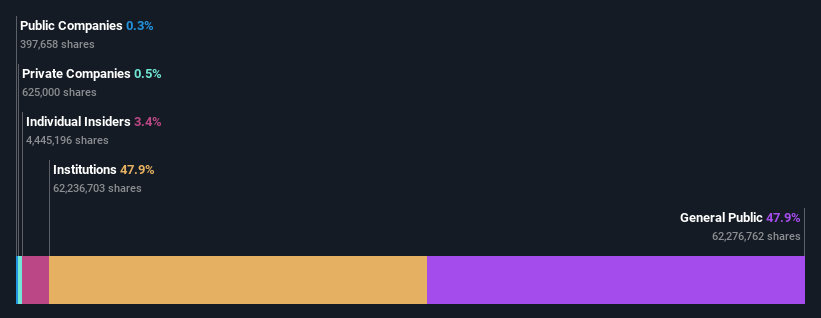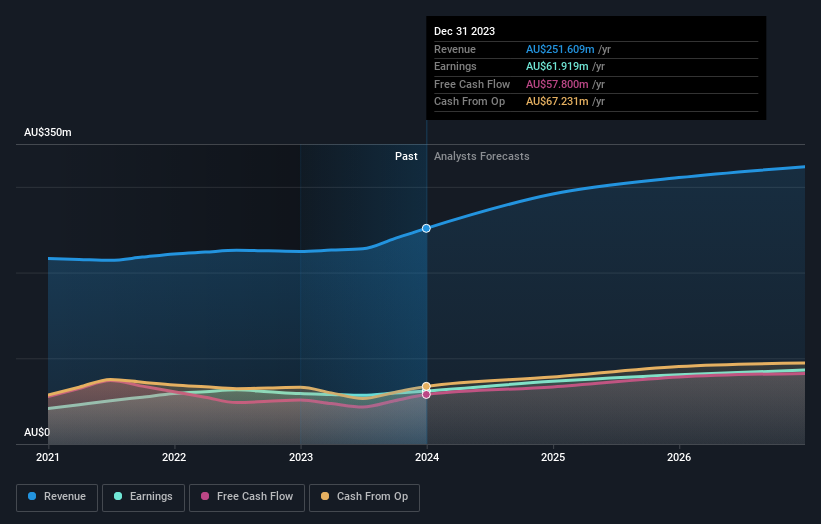Smartgroup Corporation Ltd (ASX:SIQ) most popular amongst individual investors who own 48% of the shares, institutions hold 48%
Key Insights
The considerable ownership by individual investors in Smartgroup indicates that they collectively have a greater say in management and business strategy
50% of the business is held by the top 25 shareholders
If you want to know who really controls Smartgroup Corporation Ltd (ASX:SIQ), then you'll have to look at the makeup of its share registry. And the group that holds the biggest piece of the pie are individual investors with 48% ownership. That is, the group stands to benefit the most if the stock rises (or lose the most if there is a downturn).
Meanwhile, institutions make up 48% of the company’s shareholders. Insiders often own a large chunk of younger, smaller, companies while huge companies tend to have institutions as shareholders.
Let's take a closer look to see what the different types of shareholders can tell us about Smartgroup.
Check out our latest analysis for Smartgroup
What Does The Institutional Ownership Tell Us About Smartgroup?
Institutions typically measure themselves against a benchmark when reporting to their own investors, so they often become more enthusiastic about a stock once it's included in a major index. We would expect most companies to have some institutions on the register, especially if they are growing.
We can see that Smartgroup does have institutional investors; and they hold a good portion of the company's stock. This can indicate that the company has a certain degree of credibility in the investment community. However, it is best to be wary of relying on the supposed validation that comes with institutional investors. They too, get it wrong sometimes. It is not uncommon to see a big share price drop if two large institutional investors try to sell out of a stock at the same time. So it is worth checking the past earnings trajectory of Smartgroup, (below). Of course, keep in mind that there are other factors to consider, too.
Smartgroup is not owned by hedge funds. First Sentier Investors (Australia) IM Ltd is currently the largest shareholder, with 6.2% of shares outstanding. Australian Retirement Trust Pty Ltd is the second largest shareholder owning 5.4% of common stock, and L1 Capital Pty. Limited holds about 5.0% of the company stock. Furthermore, CEO Scott Wharton is the owner of 0.7% of the company's shares.
Our studies suggest that the top 25 shareholders collectively control less than half of the company's shares, meaning that the company's shares are widely disseminated and there is no dominant shareholder.
While studying institutional ownership for a company can add value to your research, it is also a good practice to research analyst recommendations to get a deeper understand of a stock's expected performance. There are plenty of analysts covering the stock, so it might be worth seeing what they are forecasting, too.
Insider Ownership Of Smartgroup
The definition of company insiders can be subjective and does vary between jurisdictions. Our data reflects individual insiders, capturing board members at the very least. Management ultimately answers to the board. However, it is not uncommon for managers to be executive board members, especially if they are a founder or the CEO.
I generally consider insider ownership to be a good thing. However, on some occasions it makes it more difficult for other shareholders to hold the board accountable for decisions.
Shareholders would probably be interested to learn that insiders own shares in Smartgroup Corporation Ltd. In their own names, insiders own AU$43m worth of stock in the AU$1.3b company. It is good to see some investment by insiders, but it might be worth checking if those insiders have been buying.
General Public Ownership
With a 48% ownership, the general public, mostly comprising of individual investors, have some degree of sway over Smartgroup. While this group can't necessarily call the shots, it can certainly have a real influence on how the company is run.
Next Steps:
It's always worth thinking about the different groups who own shares in a company. But to understand Smartgroup better, we need to consider many other factors. For example, we've discovered 1 warning sign for Smartgroup that you should be aware of before investing here.
But ultimately it is the future, not the past, that will determine how well the owners of this business will do. Therefore we think it advisable to take a look at this free report showing whether analysts are predicting a brighter future.
NB: Figures in this article are calculated using data from the last twelve months, which refer to the 12-month period ending on the last date of the month the financial statement is dated. This may not be consistent with full year annual report figures.
Have feedback on this article? Concerned about the content? Get in touch with us directly. Alternatively, email editorial-team (at) simplywallst.com.
This article by Simply Wall St is general in nature. We provide commentary based on historical data and analyst forecasts only using an unbiased methodology and our articles are not intended to be financial advice. It does not constitute a recommendation to buy or sell any stock, and does not take account of your objectives, or your financial situation. We aim to bring you long-term focused analysis driven by fundamental data. Note that our analysis may not factor in the latest price-sensitive company announcements or qualitative material. Simply Wall St has no position in any stocks mentioned.

 Yahoo Finance
Yahoo Finance 

